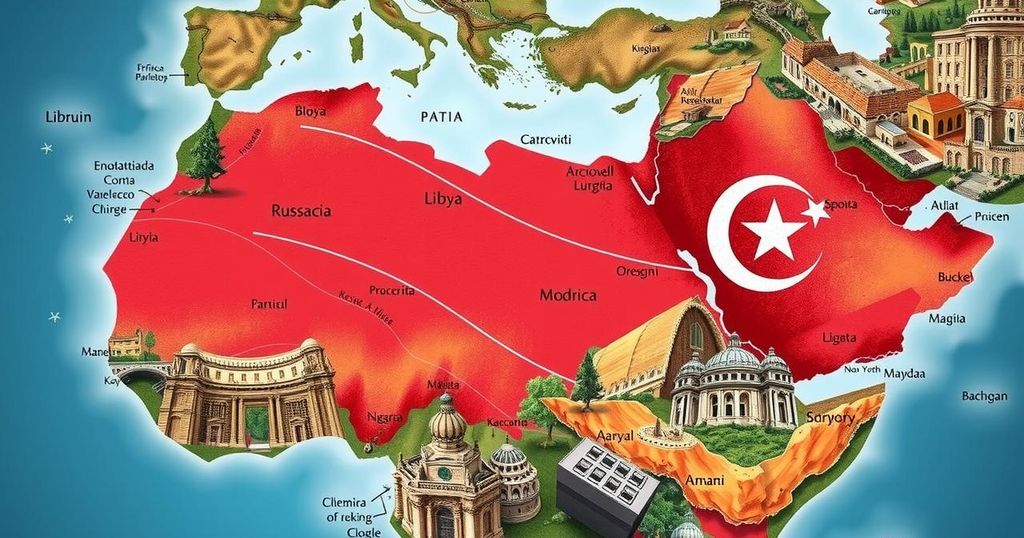World news
AFP, AFRICA, AHMED AL - SHARAA, ALL, ASIA, BASHAR AL - ASSAD, CENTRAL AFRICAN REPUBLIC, EUROPE/ASIA, GOVERNMENT OF NATIONAL UNITY, HARCHAOUI, INTERNATIONAL RELATIONS, JA, KHALIFA HAFTAR, LIBYA, MILITARY, MOROCCO, RUSI, RUSI THINK TANK, RUSSIA, SAHEL, SANCTIONS, SYRIA, WAR
David O'Sullivan
0 Comments
Russia Shifts Focus to Libya as New Strategic Base Following Syria’s Turmoil
Following the decline of Bashar al-Assad’s regime, Russia is focusing on Libya to maintain its strategic foothold in Africa. With Khalifa Haftar as a key ally, Russia aims to counter Western interests in a politically fractious region. The shift reveals both opportunities and challenges, highlighting the complexities of expanding Russian influence in the African continent post-Syria.
The Kremlin is pivoting its focus towards Libya as a strategic alternative following the instability wrought by the fall of its ally Bashar al-Assad in Syria. This shift may signify a deeper alignment of Russian military interests in Africa, with efforts underway to solidify a presence supporting Khalifa Haftar, a Libyan commander opposed to the UN-recognized Government of National Unity (GNU) in Tripoli. Experts suggest that navigating the complex political landscape of Libya will pose significant challenges for Moscow, differing greatly from the conditions previously enjoyed in Syria.
Russia has established a military foothold in Syria, utilizing a port and an airbase to extend its influence throughout the Mediterranean and into Africa, particularly targeting regions such as the Sahel and Central Africa. However, with Syria’s political landscape evolving, the Kremlin is compelled to reassess its strategy to maintain its influence and objectives on the continent. Recent developments indicate an escalation of support for Haftar, as evidenced by the deployment of mercenaries and military resources to bolster his position against rival factions.
Investigations have revealed increased Russian military activity in Libya, with significant equipment transfers from Syria. Reports from sources such as the Wall Street Journal highlight the movement of advanced radars and missile systems into Libyan territory, emphasizing Russia’s commitment to reinforcing its military presence in the region. Analysts argue that Moscow’s efforts in Libya are not merely a response to shifting circumstances but reflect a broader strategy to secure long-term advantages in African geopolitics.
The geopolitical implications of this move cannot be underestimated, as Libya’s internal conflicts provide an avenue for Russia to disrupt Western interests and influence. Analysts have drawn parallels between Russia’s strategies in Syria and Libya, emphasizing the necessity of maintaining a strategic proxy model while cautioned by the risks presented by Libya’s multifaceted political environment. Unlike Syria’s relative opacity, Libya has multiple external influences and actors, making clandestine actions more precarious.
The emerging scenario signifies that Moscow must navigate through a crowded field of competing interests, including those of Turkey and other regional powers aligned with various factions. As Libya’s political landscape continues to evolve, the Kremlin likely understands the need for a contingency plan, ensuring it does not repeat its past mistakes of leaning too heavily on a local authority without viable alternatives. The challenge remains substantial, and the impact of these developments will be keenly monitored by international stakeholders.
The article discusses the strategic shift of Russia’s military interests from Syria to Libya amid evolving geopolitical dynamics. With the fall of Bashar al-Assad’s regime in Syria, the Kremlin recognizes the need to maintain its influence in Africa by solidifying alliances with local leaders like Khalifa Haftar in Libya. Russia’s involvement in these regions is indicative of its broader ambition to counter Western influence and secure its operational foothold, particularly in light of disruptions within Syria and ongoing conflict dynamics in Libya.
In conclusion, Russia’s pivot to Libya as a new strategic launchpad reflects its need to adapt to changing conditions following the turbulence in Syria. The complexities of Libya’s political landscape present both opportunities and challenges for Moscow as it seeks to establish a foothold in Africa. This transition illustrates Russia’s intent to assert its influence while navigating the intricate web of regional power dynamics and the emerging competition for control from various international stakeholders.
Original Source: www.france24.com




Post Comment